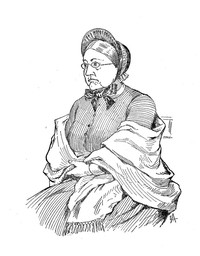Samantha at Saratoga by Marietta Holley (e book reader pc .TXT) 📗

- Author: Marietta Holley
Book online «Samantha at Saratoga by Marietta Holley (e book reader pc .TXT) 📗». Author Marietta Holley
Just as you can see through the blue haze that lays before our forest in Injun summer. Come nigh up to it and you can see the silvery trunks of the maples and the red sumac leaves, and the bright evergreens, and the forms of the happy hunters a passin’ along under the glint of the sunbeams and the soft shadows.
They died in Injun summer. I made a wreath myself of the bright-colored leaves to lay on their coffins. Dead leaves, dead to all use and purpose here, and yet with the bright mysterious glow upon them that put me in mind of some immortal destiny and blossoming beyond our poor dim vision. Jane Smedley wuz a good woman, and so wuz Jim, good but shiftless.
But I made the same wreath for her and Jim, and the strange mellow light lay on both of ’em, makin’ me think in spite of myself of some happy sunrisin’ that haply may dawn on some future huntin’ ground, where poor Jim Smedley even, may strike the trail of success and happiness, hid now from the sight of Samantha, hid from Josiah.
Wall, they died within a week’s time of each other, and left nine children, the oldest one of ’em not quite fifteen. She, the oldest one, wuz a good girl, only she had the rickets so that when she walked, she seemed to walk off all over the house backwards, and sideways, and every way, but when she sot down, she wuz a good stiddy girl, and faithful; she took after her mother, and her mother took after her grandmother, so there wuz three takin’ after each other, one right after the other.
Jane wuz a good, faithful, hard-workin’ creeter when she wuz well, brought up her children good as she could, learnt ’em the catechism, and took in all kinds of work to earn a little somethin’ towards gettin’ a home for ’em; she and her mother both did, her mother lived with ’em, and wuz a smart old woman, too, for one that wuz pretty nigh ninety. And she wuzn’t worrysome much, only about one thing—she wanted a home, wanted a home dretfully. Some wimmen are so; she had moved round so much, from one poor old place to another, that she sort o’ hankered after bein’ settled down into a stiddy home.
Wall, there wuz eight children younger than Marvilla, that wuz the oldest young girl’s name. Eight of ’em, countin’ each pair of twins as two, as I s’pose they ort. The Town buried the father and mother, which wuz likely and clever in it, but after that it wouldn’t give only jest so much a week, which wuz very little, because it said, Town did, that they could go to the poor-house, they could be supported easier there.
I don’t know as the Town could really be blamed for sayin’ it, and yet it seemed kinder mean in it, the Town wuz so big, and the children, most of ’em, wuz so little.
But any way, it wuz jest sot on it, and there wuz the end of it, for you might jest as well dispute the wind as to dispute the Town when it gets sot.
Wall, the old grandma said she would die in the streets before she would go to the poor-house. She had come from a good family in the first place,
They say she run away and left a good home and got married, and did dretful poor in the married state. He waz shiftless and didn’t have nothin’ and didn’t lay up any. And she didn’t keep any of her old possessions only jest her pride. She kept that, or enough of it to say that she would die on the road before she would go to the poor-house. And once I see her cry she wanted a home so bad.
And lots of folks blamed her for it, blamed the old woman awfully. They said pride wuz so wicked. Wimmen who would run like deers if company came when they wuzn’t dressed up slick, they would say the minute they got back into the room, all out of breath with hurryin’ into their best clothes, they’d say a pantin’ “That old woman ought to be made to go to the poorhouse, to take the pride out of her, pride wuz so awfully, dretfully wicked, and it wuz a shame that she wuz so ongrateful as to want a home of her own.” And then they would set down and rest.
Wall, the family wuz in a sufferin’ state. The Town allowed ’em one dollar a week. But how wuz ten human beings to live on a dollar a week. The children worked every chance they got, but they couldn’t earn enough to keep ’em in shoes, let alone other clothin’ and vittles. And the old house wuz too cold for ’em to stay in durin’ the cold weather, it wuz for Grandma Smedley, anyway, if the children could stand it she couldn’t. And what wuz to be done. A cold winter wuz a cumin’ on, and it wouldn’t delay a minute because Jim Smedley had got shot, and his wife had follered him, into, let us hope, a happier huntin’ ground than he had ever found in earthly forests.
Wall, I proposed to have a pound party for ’em. I said they might have it to our house if they wanted it, but if they thought they wanted it in a more central place (our house wuz quite a little to one side), why we could have it to the schoolhouse.
I proposed to Josiah the first one. He wuz a settin’ by the fire relapsed into silence. It wuz a cold night outside, but the red curtains wuz down at our sitting-room winders, shettin’ out the cold drizzlin’ storm of hail and snow that wuz a deseendin’ onto the earth. The fire burned up warm and bright, and we sot there in our comfortable home, with the teakettle singin’ on the stove, and the tea-table set out cosy and cheerful, for Josiah had been away and I had waited supper for him.
As I sot there waitin’ for the tea-kettle to bile (and when I say bile, I mean bile, I don’t, mean simmer) the thought of the Smedleys would come in. The warm red curtains would keep the storm out, but they couldn’t keep the thought of the children, and the feeble old grandmother out of the room. They come right in, through the curtains, and the firelight, and everything, and sot right down by me and hanted me.
And what curious creeters thoughts be, haint they? and oncertain, too. You may make all your plans to get away from ’em. You may shet up your doors and winders, and set with a veil on and an umbrell up - but good land! how easy they jest ontackle the doors and windows, with no sounds of ontacklin’ and come right in by you.
First you know there they be right by the side of you, under your umbrell, under your veil, under your spectacles, a lookin’ right down into your soul, and a hantin’ you.
And then agin, when you expect to be hanted by ’em, lay out to, why, they’ll jest stand off somewhere else, and don’t come nigh you. Don’t want to. Oncertain creeters, thoughts be, and curious, curious where they come from, and how.
Why, I got to thinkin’ about it the other day, and I got lost, some like children settin’ on a log over a creek a ridin’; there they be, and there the log is, but they don’t seem to be there, they seem to be a floatin’ down the water.
And there I wuz, a settin’ in my rockin’ chair, and I seemed to be a floatin’ down deep water, very deep. A thinkin’ and a wonderin’. A thinkin’ how all through the ages what secrets God had told to man when the time had come, and the reverent soul below was ready to hear the low words whispered to his soul, and a wonderin’ what strange revelation God held now, ready to reveal when the soul below had fitted itself to hear, and comprehend it.
Ah! such mysteries as He will reveal to us if we will listen. If we wait for God’s voice. If we did not heed so much the confusing clamor of the world’s voices about us. Emulation, envy, anger, strife, jealousy; if we turned our heads away from these discords, and in the silence which is God’s temple, listened, listened,—who knows the secrets He would make known to us?
Secrets of the day, secrets of the night, the sunshine, the lightning, the storm. The white glow of that wonderful light that is not like the glow of the sun or of the moon, but yet lighteth the world. That strange light that has a soul - that reads our thoughts, translates our wishes, overleaps distance, carrying our whispered words after holding our thoughts for ages, and then unfoldin’ ’em at will. What other wondrous mysteries lie concealed, wrapped around by that soft pure flame, mysteries that shall lie hidden until some inspired eye shall be waiting, looking upward at the moment when God’s hand shall draw back the shining veil for an instant, and let him read the glowing secret.
Secrets of language! shall some simple power, some symbol be revealed, and the nations speak together?
Secrets of song! shall some serene, harmonious soul catch the note to celestial melodies?
Secrets of sight! shall the eyes too dim now, see the faces of the silent throngs that surround them, “the great cloud of witnesses”?
Secrets of the green pathways that lead up through the blue silent fields of space - shall we float from star to star?
Secrets of holiness! shall earthly faces wear the pure light of the immortals?
But oh! who shall be the happy soul that shall be listening when the time has fully come and He shall reveal His great secret? The happy soul listening so intently that it shall catch the low, clear whisper.
Listening, maybe, through the sweet twilight shadows for the wonderful secret, while the silver shallop of the moon is becalmed over the high northern mountains, as if a fleet of heavenly guests had floated down through the clear ocean waves of the sky to listen too - to hear the wonderful heavenly secret revealed to man - and a clear star looks out over the glowing rose of the western heavens, looking down like God’s eye, searching his soul, searching if it be worthy of the great trust.
Maybe it will be in the fresh dawning of the day, that the great secret will grow bright and clear and luminous, as the dawning of the light.
Maybe it will be in the midst of the storm - a mighty voice borne along by the breath of the wind and the thunder, clamoring and demanding the hearer to listen.
Oh! if we were only good enough, only pure enough, what might not our rapt vision discern?
But we know not where or when the time shall be fully come, but who, who, shall be the happy soul that shall, at the time, be listening?
Oh! how deep, how strange the waters wuz, and how I floated away on ’em, and how I didn’t. For there I wuz a settin in my own rockin’ chair and there opposite me sot my own Josiah a whittlin’, for the World hadn’t come, and he wuz restless and ill at ease, and time hung heavy on his hands.
There I sot the same Samantha - and the thought of the Smedleys, the same old Smedleys, was a hantin’ of me, the same old hant, and I says to my Josiah, says I: “Josiah, I can’t help thinkin’ about the Smedleys,” says I. “What do you think about havin’ a pound party for ’em, and will you take holt, and do your part?”
“Good land, Samantha! Are you crazy? Crazy as a loon? What under the sun do you want to pound the Smedleys for? I should think they had trouble enough without poundin’ ’em. Why,” says he, “the old woman couldn’t stand any poundin’ at all, without killin’ her right out and out, and the childern haint over tough any of ’em. Why, what has got into you? I never knew you to propose anything of that wicked kind before. I sha’n’t have anything to do with it. If you want ’em pounded you must get your own club and do your own poundin’.”
Says I, “I don’t mean poundin’ ’em with a club, but let folks buy a pound of different things to eat and drink and carry it to ’em, and we can try and raise a little money





Comments (0)